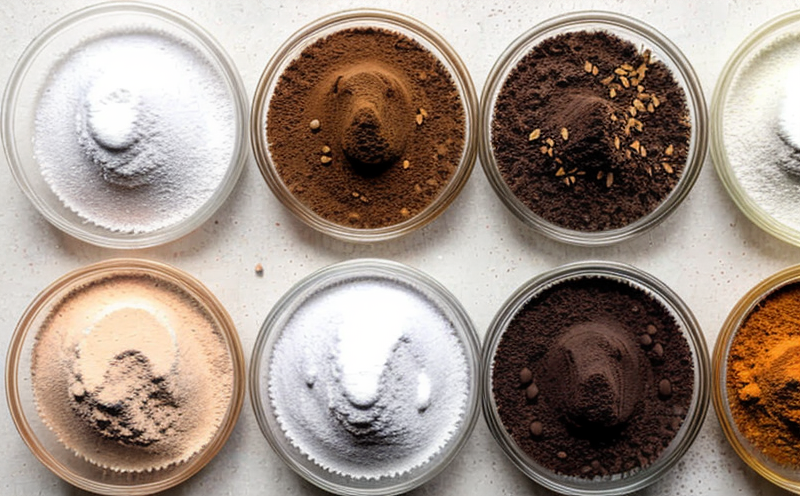USDA FSIS Artificial Sweetener Analysis in Infant Foods
The United States Department of Agriculture (USDA) Food Safety and Inspection Service (FSIS) plays a crucial role in ensuring the safety, quality, and proper labeling of all meat, poultry, and processed egg products. In recent years, there has been increased scrutiny on artificial sweeteners used in infant foods to ensure they meet stringent safety standards set by FSIS.
Infant formula manufacturers must comply with strict regulations regarding the types and quantities of ingredients, including artificial sweeteners like aspartame, sucralose, and acesulfame-K. These sweeteners are often added to enhance taste without adding calories, but their presence in infant foods necessitates rigorous testing to ensure they do not pose any health risks.
The USDA FSIS Artificial Sweetener Analysis in Infant Foods service involves comprehensive testing of these additives using advanced analytical techniques that adhere strictly to recognized standards such as ISO and ASTM. The primary focus is on detecting the presence, concentration levels, and compliance with acceptable limits set by regulatory bodies like FDA and FSIS.
The testing process begins with meticulous sample preparation, which includes extracting the sweeteners from various infant food products using appropriate solvents followed by purification steps to ensure accurate quantification. High-performance liquid chromatography (HPLC), mass spectrometry (MS), and other advanced analytical instruments are employed for precise measurement.
Our team of experts ensures that every step in the process complies with FSIS guidelines, including sample handling, extraction methods, calibration procedures, and data interpretation. Compliance reports are generated based on these analyses, providing clients with detailed insights into their product's compliance status.
The importance of this service cannot be overstated given the potential health implications associated with non-compliant artificial sweeteners in infant foods. By adhering to rigorous testing protocols, manufacturers can safeguard public health and maintain consumer trust. This service not only helps in maintaining regulatory compliance but also enhances brand reputation through transparent practices.
Furthermore, this analysis plays a vital role in R&D efforts aimed at developing safer alternatives or reformulating existing products without compromising taste quality. The results from our tests provide valuable feedback for ongoing product improvement initiatives ensuring that infants receive safe and nutritious food choices.
Scope and Methodology
The scope of the USDA FSIS Artificial Sweetener Analysis in Infant Foods service encompasses a wide range of analytical procedures designed to meet the stringent requirements set by regulatory agencies. Our methodology includes:
- Sample Preparation: Carefully selecting representative samples from different batches or lots to ensure data reliability.
- Extraction Techniques: Utilizing solvent-based extraction methods followed by filtration and purification processes.
- Analytical Instruments: Employing high-performance liquid chromatography (HPLC), mass spectrometry (MS), and other advanced analytical tools for precise quantification.
- Data Interpretation: Applying statistical analysis to interpret results against established limits.
This comprehensive approach guarantees accurate detection of artificial sweeteners within infant foods, ensuring compliance with both national and international standards. Each step in the process adheres strictly to recognized protocols like ISO 17025 and ASTM E3486-20 for quality assurance.
Benefits
The benefits of our USDA FSIS Artificial Sweetener Analysis in Infant Foods service extend beyond mere compliance; they contribute significantly to maintaining public health and safety while enhancing brand reputation. Some key advantages include:
- Regulatory Compliance: Ensures strict adherence to FDA and FSIS regulations regarding artificial sweeteners in infant foods.
- Risk Mitigation: Identifies potential safety issues early, allowing for corrective actions before they escalate into larger problems.
- Enhanced Brand Reputation: Demonstrates commitment to producing safe and nutritious products, fostering trust among consumers.
- Competitive Edge: Differentiates brands by showcasing a proactive approach towards product safety.
Use Cases and Application Examples
This service finds application in various scenarios within the food and beverage industry, particularly for infant formula manufacturers. Some specific use cases include:
- R&D Projects: Assists researchers in identifying new safe alternatives or optimizing existing formulations.
- Quality Control: Regularly monitors production processes to ensure consistent quality and compliance.
- Litigation Support: Provides robust evidence during legal disputes related to product safety.
- Market Expansion: Helps companies enter new markets by ensuring products meet local regulations.





